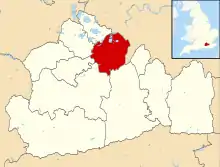Reed's School
Reed's School is an independent day and boarding school for boys located in Cobham, Surrey, England. The school was founded in 1813, by Rev. Andrew Reed, D.D. and incorporated by Act of Parliament in 1845 under the presidency of the Archbishop of Canterbury, the Duke of Wellington and the Marquess of Salisbury. Its pupils comprise only boys until Year 11, but girls are admitted in Years 12 & 13. There are currently around 700 day pupils (620 boys, 80 girls) and 100 full-time boarders (80 boys, 20 girls). Since 1951, Queen Elizabeth II has acted as the school's 15th patron and has visited the school twice as the reigning monarch, in 1997 and in 2014.[1] Former pupils are known as ’Old Reedonians’.
| Reed's School | |
|---|---|
| Address | |
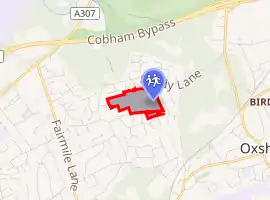
| |
Sandy Lane , , KT11 2ES | |
| Coordinates | 51.338253°N 0.375981°W |
| Information | |
| Type | Public school Independent day and boarding school |
| Motto | Fide (Have Faith) |
| Religious affiliation(s) | Anglican |
| Established | 1813 |
| Founder | Rev. Dr Andrew Reed |
| Local authority | Surrey County Council |
| Department for Education URN | 125321 Tables |
| Chair of Governors | Mike Wheeler |
| Headmaster | Mark Hoskins |
| Gender | Boys, with a co-educational sixth form |
| Age | 11 to 18 |
| Enrolment | 700 (620 boys, 80 girls) |
| Houses | Blathwayt, Bristowe, Capel & Mullens |
| Colour(s) | Navy |
| Publication | Reedonian |
| School fees | £32,910 (boarders); £25,530 (day pupils) |
| Alumni | Old Reedonians |
| Website | www |
History
Founding
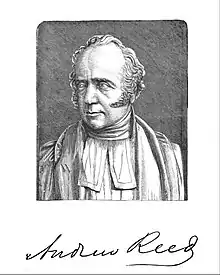
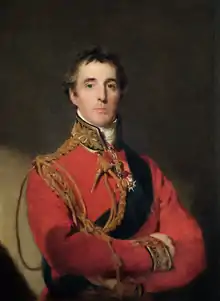
On 24 June 1813 the Rev Andrew Reed D.D., descended from a Norfolk political family, gathered a group of friends at his house in St. George's Place, Cannon Street Road, to discuss his proposals for forming an educational institution to assist orphaned children. A month later, on 27 July the East London Orphan Asylum was formally established. Reed gave an address in 1815, which was printed every year in the annual report, in which he set out the aims of the institution. He said that ‘the present day is the period of benevolence and philanthropy’ and that ‘the widow and orphan have an undisputed claim to our benevolence’. The aims he sought were set out in the general constitution adopted at a meeting of subscribers on 20 April 1815.
The objects of the charity were to provide relief to destitute orphans (defined as children who had lost either both parents or their father). It was emphasised from the beginning that children whose parents had been in respectable circumstances had the first claim on the charity.
By the time the general constitution was adopted in 1815 the charity had become established in a small way. A house in Clarke's Terrace, Cannon Street Road, was taken in April 1814 for the use of the charity, a matron was chosen and a ladies’ committee appointed. In July three girls were elected as the first children to be helped. In February 1815 the word ‘East’ was dropped from the original title. Reed realised that he needed to obtain much more than local support if the institution was to flourish and, despite his nonconformist background, he recognised that the charity was unlikely to succeed unless it adopted the principles of the Church of England.
Reed does not seem to have had much personal wealth, but he was able to attract the support and patronage of those who did. Prince Edward, Duke of Kent and Strathearn presided at the first annual festival dinner in 1815, establishing a virtually continuous history of royal patronage. Reed was able to secure financial support from the Stock Exchange and City Livery Companies, again establishing a tradition which has continued throughout the history of the school. James Capel of the stock broking firm of that name was a prominent early member of the board of managers (one of the school houses is named after him). Another notable early sponsor was the Duke of Wellington, a future Prime Minister of the United Kingdom.
London Orphan Asylum, London (1813-1871)
Initially the Asylum used two houses; one at Hackney Road, Shoreditch for the boys and one in Bethnal Green for the girls.[2] By 1820 this accommodation was inadequate, so 8 acres of land were purchased at Clapton as the site for new buildings. So the asylum's first unified site was at Lower Clapton Road, Clapton, where Newcome's School had stood.[3] The neo-classical designs submitted by the architect William Southcote Inman (1798 – 1879) were chosen and an appeal was launched for the funds to pay for the buildings. The foundation stone was laid by Frederick, Duke of York on 5 May 1823. The new buildings were completed by 1825 and were officially opened on 16 June by Prince Adolphus, Duke of Cambridge. There were 206 pupils in 1826 and 453 in the 1860s. During the asylum's time in East London, it was famous for having had some 2000 hymns written for it by the English architect James Edmeston (one each Sunday), a strong supporter of and frequent visitor to the London Orphan Asylum. Henry Beattie was chaplain and headmaster between 1852 and 1870. After the school's move to Watford, the East London buildings were used by the Salvation Army. Indeed, the three-day lying in state of the organisation's founder, William Booth, occurred there in 1912. Now, however, only the facade of the classical-style building remains.[4]
London Orphan Asylum/School, Watford (1871-1939)
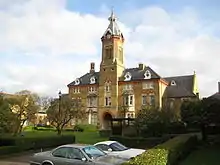
In November 1866 a typhoid epidemic killed 15 children and precipitated the board of managers into a decision to move the school to a new site. In 1867 they purchased 36 acres of land at Watford and chose the plans of the architect Henry Dawson (father of Bertrand Dawson) for the new school. The foundation stone was laid by the Prince of Wales, later Edward VII, and his wife the Princess of Wales and future Queen Alexandra, on 15 July 1869. The school was formally opened in 1871. It was renamed "London Orphan School" in 1915 (finally, in 1939, this was changed to "Reed's School" in honour of the founder). The LOA played football against Watford Rovers (the future Watford F.C.) in the early 1880s. Headmasters at the Watford site included Oliver Carter Cockrem, (M.A., LL.D.) and Rev. H.W. Russell, (B.A.). In the 1980s the buildings were converted into residential accommodation; being near to Watford Junction station they are convenient for commuters.
Reed's School, Totnes & Towcester (1939-1945)
In the 1930s, Edward, Prince of Wales (later Duke of Windsor) described the institution as a good school but said that there was one thing wrong with it - the name. So on 28 June 1939, it was called "Reed's School" in honour of the founder. During World War II the school was evacuated from Watford; the boys to the Seymour Hotel, Totnes and the girls to a number of houses near Towcester. The site was used as an Army hospital and then by the Ministry of Labour.[2]
Reed's School, Cobham (1945–present)
After the war the governors decided not to return to the school at Watford, which the government in any case wished to retain as a headquarters building for the Ministry of Labour. In 1945 Dogmersfield Park, near Basingstoke, Hampshire, a large country house with about 120 acres of grounds (now the Four Seasons Hotel), was purchased for the girls' school. For the boys the Fairmile estate of 56 acres with the buildings previously used by Sandroyd School in Sandy Lane, Cobham, was purchased. The Sandy Lane site had been purpose-built in around 1905 by architects Treadwell and Martin, who were also responsible for the design of Scott's restaurant (now part of the Trocadero Centre) and other notable structures. The new site provided facilities including a heated indoor swimming pool, a nine-hole golf course, and two squash courts.[5]
Financial difficulties made it impossible to maintain both schools, and Dogmersfield Park had to be closed in July 1955 so that all the resources could be concentrated at Cobham where the school remains today. A new headmaster, Robert Drayson, was appointed in 1955 and remained until 1964, when he migrated to Stowe. In 1950, Reed's School began to take fee-paying pupils, while retaining its charitable element. Foundation bursaries are still available for children who have lost one or both parents and currently 10% of pupils are supported in this way.
Founder's Prayer
The school's prayer, penned by the founder Rev. Andrew Reed, is recited at each chapel service:
Blessed Saviour,
Receive what I have:
Strengthen my body and uplift my mind
Let my heart be cleansed from any base feeling
Let it become the temple of the Holy Ghost,
And let me speak and act and think and live
Under His inspiration; for Thy name's sake.
Amen.
Royal patronage
In 1815 HM King George IV 'accorded his blessing' by becoming the first Royal Patron of the School, a tradition which is continued today with the Patronage of Reed's School by HM The Queen, Elizabeth II.
Patrons since 1815
- 1815 Prince Edward, Duke of Kent and Strathearn
- 1817 Prince Augustus Frederick, Duke of Sussex
- 1819 Princess Victoria of Saxe-Coburg-Saalfeld
- 1819 Leopold I of Belgium
- 1821 George IV
- 1822 Prince Frederick, Duke of York and Albany
- 1823 George IV
- 1826 Prince Adolphus, Duke of Cambridge
- 1826 William IV
- 1837 Queen Victoria
- 1843 Prince Albert of Saxe-Coburg and Gotha
- 1856 The Prince of Wales, later Edward VII
- 1870 The Princess of Wales, later Queen Alexandra
- 1910 George V
- 1936 George VI
- 1951 Elizabeth II
Houses
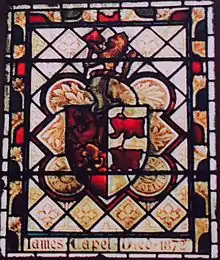
The school is made up of four houses, named after school benefactors: Blathwayt (royal blue ties), Bristowe (red ties), Capel (yellow ties) and Mullens (light blue ties). In interhouse competitions, the four houses compete for the Edmonson Cup. There is also the Hopwood Cup for the most academic house.
Years Seven and Eight in the school are separated into 'The Close', which has its own competitive houses named after sister locations: Clapton, Reedhams, Royal Putney, and Royal Wanstead.
Sports
The major sports at Reed's School are rugby, hockey and cricket with academies in tennis, skiing and golf. The Senior School pupils (13+) play rugby, hockey and cricket in the Autumn, Spring and Summer Terms respectively. Pupils in The Close (the Junior School, for 11–13 year olds) play hockey, rugby and then cricket. In the 2014/15 season, rugby fixtures included matches against Brighton College, KCS, Wimbledon, Caterham and Hurstpierpoint College. Cricket is played against City of London Freeman's School, Hampton, St. Paul's, St. George's Weybridge, Lord Wandsworth, Reading Oratory, KCS Wimbledon, Eltham College, King's School, Canterbury, and Merchant Taylor's School and others. The indoor tennis centre was opened by alumnus and former British number one, Tim Henman on 18 November 2014. The facility is regarded by the LTA as one of only 17 high performance centres in the country.[6] The foundation stone for the 25 metre, five lane indoor swimming pool was laid by Duncan Goodhew on 15 November 1990.
The school performs at the highest level in a number of other sports such as squash, athletics, cross country, basketball and swimming as well as offering access to more unusual sports though an extended activities programme; such as shooting, mountain biking, kung-fu and sailing. Reed's has won the International School Sport Federation's world schools' tennis championship more than any other team (in 2009, 2011 and 2015).[7]
Rugby
Reed's school have improved at rugby over recent years with the 1st XV finishing seventh in the NatWest Schools Cup in 2014/2015 season acquiring wins against schools such as Brighton College, St John's School, Leatherhead, and St George's College, Weybridge. The season after was also successful finishing 17th in the NatWest Schools Cup with wins against St John's School, Leatherhead, Royal Grammar School, Guildford, and The Oratory School.
Ski racing
The ski team continues to be one of the best in the country, led by skiing master Mark Vernon, Reeds are regional and national title holders in both Dry Slope and Snow Ski Racing in the U14 Boys, U16 Boys and U18 Boys & Girls. Many racers who are members of the ski racing academy at Reed's have World Cup and Olympic aspirations, with multiple ORs having raced or currently on Olympic Teams, such as Luke Steyn (Capel 2012), OR Jack Gowercompeted in his world cup debut in November 2017 at Lake Louise. The team's current main sponsor is Equity; in the past it has been sponsored by Powder Byrne (when the ski academy was briefly rebranded to "Reed's Powder Byrne Ski Academy") and Fastlane.
The 2017/18 roll of honour includes students who were selected to represent Team England at the 2018 ISF World School Games in Grenoble.[8]
Music
Reed's had its new Music School officially opened by Sir Cliff Richard on 24 March 2001. Its facilities include a recital room, state-of-the-art recording Studio (updated in 2011), keyboard studio, percussion room and music library.
Scholarships and fees
Fees at age 13+ for the 2019/20 academic year are £32,910 and £25,530 per annum, for boarders and day pupils respectively. Reed's School offers a number of scholarships at 11+, 13+ and for entry to the Sixth Form in a range of areas: Academic, Art, Drama, Music, Sport, Technology and for all round ability based on a combination of these. The awards are made on the basis of competitive tests and interviews held in the Autumn term for Sixth Form or Spring term for others prior to entry to the School. These awards can (in exceptional cases) be up to a maximum of 50% of the fees.
Headmasters
- Rev. Robert Heath, M.A. (1826–1852)
- Rev. Henry Beattie, M.A. (1852–1869)
- Rev. A. F. Houliston (1869–??)
- Rev. W. F. Jones
- Rev. H. W. Bussell (1878–1886)
- Rev. A. R. Clemens (1886–1887)
- Rev. Dr. Oliver Carter Cockrem, M.A., LL.D. (1887–1915)
- Rev. E. Hartley Parker (1915–1921)
- Rev. John J. Jackson (1921–1924)
- Rev. G. K. Allen (1924–1931)
- Rev. C. R. Attenborough (1931–45)
- H. E. D. Axton (1945–1954)
- Philip Scott, acting (1954–1955)
- Robert Drayson, DSO (1955–1964)
- Rodney Exton (1964–1977) – Hampshire cricketer and schoolmaster
- John Baird Tyson, OBE, MC (1978–1982) – mountaineer and teacher
- David Prince (1983–1997)
- David Jarrett (1997–2014) – the first person to win a cricket blue for both Oxford and Cambridge[9]
- Mark Hoskins (2014–present)
Notable staff and associated people
- James Edmeston, architect and prolific hymn writer; wrote "Lead us, heavenly Father, lead us" for the children of the London Orphan Asylum
- Sir Benjamin Louis Cohen, former President of the London Orphan Asylum
- Sir William Blizard, consulting surgeon to the London Orphan Asylum
- Brett Garrard, hockey coach
- Richard Gilliat, former head of admissions and Hampshire cricketer, retired in 2017
- Keith Medlycott, cricket coach
- Tom Hardy, actor
Notable Old Reedonians
Royalty
- Prince Zeid Raad of Jordan, UN High Commissioner for Human Rights
- Prince Mired Raad of Jordan
Business
- Alan Bott, founder of Pan Books
- Sir Simon Robey, banker and co-founder of Robey Warshaw
Literature
- Thomas Burke
- Richard Dinnick, screenwriter and author
Sport
- Henrik Breimyr, Norwegian professional football player
- Jeffrey Bruma, professional footballer, currently playing for PSV Eindhoven
- Alex Corbisiero, rugby player for Northampton Saints, England and the British and Irish Lions
- Jamie Delgado, British tennis player and coach
- Daniel Douthwaite, British cricketer
- Jack Draper, British tennis player[10]
- Chris Eaton, British tennis player
- Evan Hoyt, British tennis player
- Jack Gower, British alpine ski racer
- Tim Henman OBE, British tennis player
- Oskar Kolk, cricketer
- James Morrison, golfer
- Luke Steyn, ski racer
- Theo Vukašinović, rugby player
Arts/entertainment
- Richard Bagguley, muralist and artist
- Marcel Grant, filmmaker
- Dr. Keith Scholey, nature documentary producer
- Elvi Hale, actress
- Tom Hardy CBE, actor
- Sir Simon Keenlyside CBE, opera singer
- Nigel Mitchell, television and radio presenter
- Sir Nolan, music producer and songwriter
- Shaun Scott, actor
- Renton Skinner, actor and comedian
- Toby Tarrant, radio DJ and son of Chris
- Jamie Treays, aka Jamie T, singer-songwriter
Politics
- Edward Kellett-Bowman JP, Conservative Member of the European Parliament
Law
- Stuart Popham CMG, QC, British lawyer
References
- "Queen and Duke of Edinburgh to visit Reed's School today". Surrey Comet. Archived from the original on 6 March 2014.
- "Archived copy". Archived from the original on 27 November 2009. Retrieved 18 January 2009.CS1 maint: archived copy as title (link) Exploring Surrey's Past
- T.F.T. Baker (Editor) (1995). "Hackney: Clapton". A History of the County of Middlesex: Volume 10: Hackney. Institute of Historical Research. Archived from the original on 9 February 2013. Retrieved 13 May 2013.CS1 maint: extra text: authors list (link)
- "Archived copy". Archived from the original on 15 May 2008. Retrieved 18 January 2009.CS1 maint: archived copy as title (link) London Orphan Asylum follies
- "Archived copy". Archived from the original on 12 September 2015. Retrieved 27 November 2015.CS1 maint: archived copy as title (link)
- "Archived copy". Archived from the original on 8 December 2015. Retrieved 4 December 2015.CS1 maint: archived copy as title (link)
- Spiller, Richard (29 March 2015). "Andy Murray congratulates young tennis stars on Doha success". Archived from the original on 8 December 2015.
- Reed's School website
- "David Jarrett". Cricinfo. Archived from the original on 17 November 2015.
- Eccleshare, Charlie (23 September 2018). "Britain's rising star Jack Draper: 'I'm happy with top 1,000 but I have got to push on and be hungry for more'". The Telegraph. Retrieved 5 July 2019.
